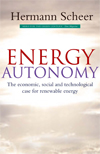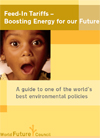Welcome to the 20th Right Livelihood Award presentation! To celebrate this anniversary, most of our recipients met last May in Salzburg, at the invitation of the State Governor to reflect together on where we are today and on priorities for the future. Recently one of our supporters described this as "the world's most meaningful award". The enthusiasm it has awakened has, I believe, a simple explanation: in a world where the gap between words and action now threatens life itself, these awards offer a practical agenda for all of us.
The initiatives which have been highlighted here over the past two decades cover the globe and the wide range of challenges facing us; architecture by and for the poor; an economics of permanence creating real human wealth for all; agriculture in tune with nature; an educational system which fosters practical livelihoods, co-existence and the growth of the human spirit; technologies for socially useful production; the empowerment of the poor and of responsible consumption; the greening of politics; legal assistance to victims of injustice and help for survivors of torture; nature protection and reforestation; the preservation of our genetic plant heritage; networking local solutions; recognition that the "future is in our hands"; protecting the richness of traditional cultures and the rights of indigenous peoples; ending the nuclear nightmare; exposing the real causes of hunger; honouring the wisdom and knowledge of the South; strengthening self-help movements and the non-violent pursuit of just peace; exposing the dangers and failures of giant "development" projects; land distribution and rural regeneration; an end to impunity for political murders; medical drug legislation in the interest of the poor; respecting the rights of children and fostering family responsibility; exposing the bad science behind genetic manipulation; upholding multi-ethnic democracy against the forces of "ethnic cleansing"; the right of a mother to say "no" to those who want to send her son to war; mobilising the poor for human "trickle-up" development; giving fair recognition to different traditions of knowledge and healing; exposing the dangers of many present chemical products and production processes; restoring a balance between people and corporate power ...
Our award recipients range from movements with hundreds of thousands of members to the lone young Lebanese kindergarten teacher, who wrote the poem which began to turn the tide against the civil war ravaging her country - and Mordechai Vanunu, who exposed his country's dangerous nuclear secrets, and who is still suffering in jail after 13 years.
Their spirit is symbolized by Wangari Maathai who, when told that the results of her decades-long reforestation campaign in Kenya could still not be detected on satellite pictures concluded that she must re-double her efforts ...
Today the road to a positive future is open if we can overcome the ideological fundamentalism of global corporate greed to which we are wrongly told "there is no alternative." There is hardly a greater danger to the very survival of human civilisation than global warming. The CO2 reductions agreed in Kyoto are far from enough to prevent it. But they are a start. Yet recently it was reported that many wealthy OECD countries will not even fulfil their Kyoto commitments. Presumably the economic cost of doing so is simply unbearable? Far from it. According to the OECD, the cost of implementation would be between 0.25% and 1% of GNP!
How will our grandchildren, when faced with the consequences of such criminal negligence, remember us? Will they see us as vile murderous monsters or merely as we today see those who voluntarily became apologists for fascist and stalinist crimes: as weak, despicable and immoral?
The choice is ours. "Never", writes Hermann Scheer in his most recent book "was political failure so comfortable." But it will not remain so for long. "Many societies in history" he continues, "did not recognize their existential challenge and thus went under and were forgotten ... Today the whole of global society finds itself in such a borderline situation. Its political and economic leading powers have shown so far, that they are incapable of dealing with this challenge. They blame "the market" and thus delegate their own responsibility onto anonymous forces."
In today's debate, "reform" and "renewal" have become codewords, not for the long overdue wrenching transformation to make our societies sustainable but for adapting to the business-as-usual politics of "after us the deluge." The Worldwide Fund for Nature has calculated that during the generation which has passed since the Club of Rome first warned us about natural limits to growth, we have used up 30% of the planet's natural wealth.
The subsidies paid by governments to corporations would be sufficient to fund the implementation of Agenda 21 for sustainable worldwide human development. Instead even the modest achievements of international co-operation to protect the poor and our future are being undermined. Environmental agreements and social justice are subordinated to outdated economic dogmas and "flexibility". Education is privatized into corporate brainwashing.
The "invisible hand" doing this is our own. All power allocations are political. Corporate claims to authority over people, markets and the global commons are not divinely ordained but are enforced by our courts, police and armies.
To change course we need to reconquer the spaces given up by democracy. We need to recapture the instruments of wealth creation and use them again for the benefit of society as a whole. For example, the creation of new (interest-free) money must again become the exclusive prerogative of sovereign governments - not of private banks, whose charging of interest on new money (in excess of savings lent to them) amounts to a gigantic private tax!
The Jubilee 2000 campaign for debt cancellation reminds us that the Bible decrees the dismantling of the structures of social and economic inequality every 50 years, in order to restore harmony in society. Other religions contain similar or stricter rules. Yet "Christian" governments in the European Union and USA complain that the South Korean campaign to encourage frugality is an "impediment to trade". This madness may of course continue for another few decades, until oil, gas etc. have run out, the oceans have risen, our children have been poisoned and the wretched of the earth have embraced terrorism as their only option for survival.
In his book "One World, Ready or Not: the Manic Logic of Global Capitalism", the well-known US writer William Greider warns that "The advanced nations have entered a pre-fascist social condition that will ripen in various ugly ways if the market's imperatives prevail, if commerce and finance refuse to compromise their objectives."
That danger is real as recent events in Sweden have shown. Whether it happens depends on everyone of us. Right Livelihood Award recipients are not here to be admired from afar. They are here to be emulated. They show what we can do. But are they not extra-ordinary? Certainly, but as one of our early recipients, Mike Cooley, said: "All the people I meet are extra-ordinary!".
Ten years ago the face of our world was changed utterly in a few months. Old certainties disappeared overnight. Seemingly impenetrable power structures crumbled. The threat of nuclear war was much reduced and many millions could breathe freely. But the task is only half done - and ours will be more difficult, for the alternative is not yet clear to many despite the deep collective disillusionment and wide-spread malaise in our societies.
People cherish other truths than those of the market and have other priorities besides those of consumers. A society which attempts to reduce its citizens to one dimensional economic beings and neglects to honour and foster their non-market preferences is destroying itself.
Let us therefore stop rewarding human weakness and start building on our strengths. We are, as Jonas Salk once said, the first generation in human history in which large numbers of people are taking personal responsibility for the future of the entire species.



